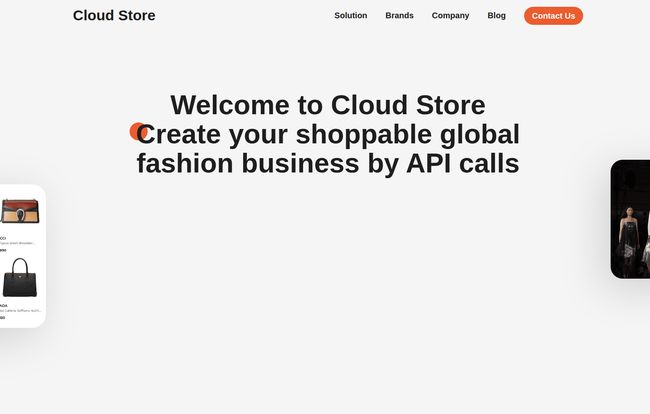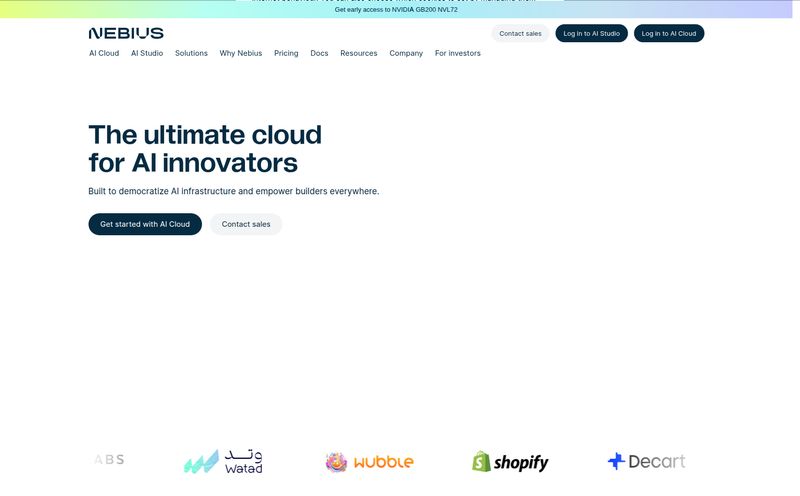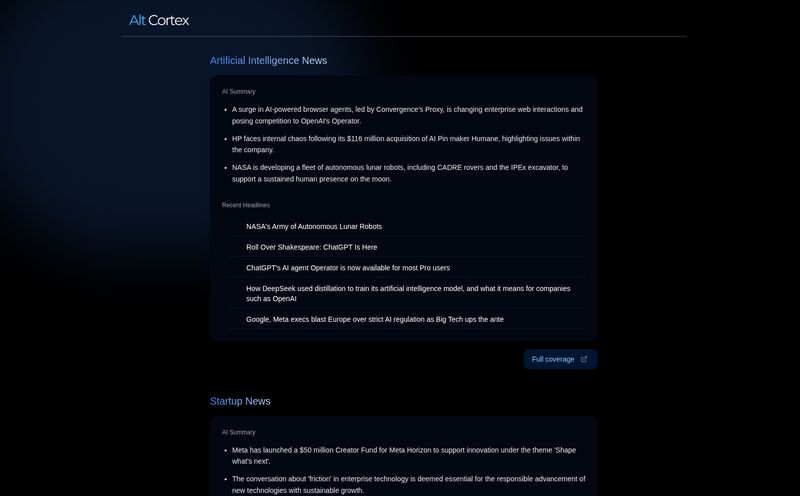Anyone who’s been in the e-commerce game for more than a minute knows the grind. Finding winning products, wrestling with clunky supplier websites, managing inventory (or the lack thereof), and the absolute headache that is international logistics. For years, the dream has been to just… sell. To focus on marketing and building a brand, not on whether a package from Shenzhen will ever actually arrive.
We've seen platforms come and go, each promising to simplify the process. But lately, there's been a different kind of buzz, a shift away from all-in-one platforms toward a more flexible, API-first approach. It’s a bit more techy, sure, but it's powerful. And right in the middle of this conversation, I stumbled upon a name that keeps popping up: Cloud Store AI. It promises a plug-and-play API to build a global fashion business from scratch. Big promises. So, I decided to pull back the curtain and see if it's the real deal or just more marketing fluff.
What Exactly is Cloud Store AI Anyway?
Okay, let's break it down. Cloud Store AI isn't another Shopify clone. You don't log in and pick a theme. Think of it less like renting a pre-built shop and more like being handed the keys to a global warehouse, a universal credit card machine, and a team of super-smart robot assistants. It’s a set of tools—specifically, APIs—that developers and businesses can use to build their own custom shopping experiences.
It’s designed for a pretty wide range of folks: dropshipping merchants looking to automate, influencers who want to create truly shoppable content, and even AI startups building the next generation of shopping agents. The whole idea is to give you the backend infrastructure of a massive e-commerce operation, all accessible through code.

Visit Cloud Store AI
The Core Features That Caught My Eye
When I look at a new tool, I immediately hunt for the features that solve a real, nagging problem. Cloud Store AI has a few that genuinely stand out from the crowd.
The Massive Product Catalog API
First off, the product access. Their site touts over 20 million SKUs from major global merchants. We're talking giants like SHEIN, Temu, and Alibaba.com. For anyone who's spent hours scraping AliExpress for decent products and reliable suppliers, this is a breath of fresh air. Instead of manually importing products via CSV files and praying the data is correct, you get real-time access to a massive, trendy catalog through an API. This means your site can display up-to-date stock levels, prices, and product variations without you lifting a finger. That's a huge operational win.
Universal Checkout and Logistics: Solving the Boring Stuff
Here’s where things get really interesting for me. Managing payments and shipping is the unglamorous side of e-commerce that can sink a business. Cloud Store offers a Universal Checkout API, which aims to streamline the buying process into a single, cohesive flow, no matter where the product is coming from. And their Logistics API handles the cross-border fulfillment and package tracking.
Honestly, this is a big deal. The complexity of international shipping, taxes, and duties is a massive barrier for small sellers. Offloading that entire process to a single API integration could free up an incredible amount of time and reduce customer service nightmares. “Where’s my order?” is a question I’m happy to answer less often.
The “AI” in Cloud Store AI
The name isn’t just for show. The platform has a significant AI component focused on smart product recommendations and shopping automation. Think about how Amazon or Netflix always seem to know what you want to see next. Cloud Store AI aims to bring that level of personalization to any site or app built on its platform. Their website even highlights a use case for AI shopping agents, which are becoming a bigger and bigger part of the conversation around conversational commerce. It's one thing to have a catalog; it's another to have an intelligent layer that helps customers discover products within it. This feels forward-thinking.
Who is This Really For? A Breakdown
So, is this a tool for everyone? Not quite. And that's okay. Here’s my take on who stands to gain the most:
- The Savvy Dropshipper: If you've moved past the beginner stage and are looking to build a more scalable, automated business, this is compelling. It’s a step up from the typical plugin-heavy Shopify setup.
- Influencers and Publishers: Imagine a fashion blogger being able to make their entire website shoppable, with a unified cart and checkout, pulling products from dozens of merchants. It turns your content from an affiliate link farm into a genuine retail experience. This is how you properly monetize an audience in 2024.
- Developers & Startups: If you have an idea for a new e-commerce app, a personal shopping AI, or a niche marketplace, Cloud Store AI provides the foundational blocks. It lets you focus on building a unique front-end experience without having to build the entire supply chain from scratch.
My Unfiltered Thoughts: The Good, The Bad, and The API-Dependent
Alright, no tool is perfect. After digging through their site and thinking about the practical application, here’s my honest assessment.
On the plus side, the speed to market is a massive advantage. One of their case studies mentions a dropshipping business that launched in a single day. That's insane. The access to trendy, fast-fashion products that people are actively searching for is another huge plus. You're tapping into the zeitgeist of what's selling right now.
However, there are some important caveats. This is not for the technically faint of heart. You or someone on your team needs to be comfortable working with APIs. This isn't a drag-and-drop builder. It’s a powerful engine, but you still need a mechanic to install it. You’re also building your business on their infrastructure, which comes with a degree of dependency. If they have downtime, you have downtime.
And then there’s the pricing. Or, the lack of it. I went looking for a pricing page, and all I found was a cryptic XML error. Classic. This almost certainly means it’s a “contact us for a quote” model, which suggests it's priced for serious businesses based on API calls and volume, not a simple monthly subscription. Not necessarily a bad thing, but something to be aware of.
We saw a 200% increase in conversions in the second month after integrating Cloud Store API.
- Testimonial from an AI Shopping Agent on the Cloud Store AI website.
Let's Talk Numbers: Does it Actually Work?
The quote above is pretty powerful. A 200% increase in conversions is the kind of metric that makes you sit up and pay attention. The site also throws around some big numbers like over a billion in GMV and 5 million orders processed. While these are self-reported, they do suggest that this isn't just a theoretical platform; it’s being used at scale. It shows there's real transaction volume flowing through their systems, which is a good sign of a healthy, functioning infrastructure.
Frequently Asked Questions about Cloud Store AI
I've seen a few questions pop up, so let's tackle them head-on.
Is Cloud Store AI just for dropshipping?
Not at all. While it's a fantastic tool for dropshippers, it's also built for publishers, content creators, and developers building unique AI-powered shopping applications. It's more of a foundational e-commerce infrastructure.
Do I need to be a developer to use it?
Yes, you'll need some technical chops. This is an API-first platform. If you're not a developer yourself, you would need to hire one to integrate the APIs into your website or application.
How much does Cloud Store AI cost?
The pricing isn't publicy available. This usually means it's a usage-based or enterprise model where you contact their sales team for a custom quote based on your needs, like the number of API calls you expect to make.
Can I really access products from SHEIN and Temu?
According to their website, yes. They list these companies as merchant partners, meaning their vast product catalogs are accessible through the Cloud Store API. This is one of their main selling points.
What's the difference between this and just using the Shopify App Store?
Think of it like this: the Shopify App Store gives you apps to add features to your pre-built car. Cloud Store AI gives you teh engine, the chassis, and the wheels to build any kind of vehicle you want. It’s more fundamental and offers far more creative freedom, at the cost of being more complex.
Is It The Future? My Final Verdict
So, what’s the final word? I think Cloud Store AI is a genuinely powerful and exciting platform for the right user. It is not a silver bullet for e-commerce beginners. It is, however, a potential game-changer for established sellers, developers, and media brands who want to build something truly custom without reinventing the wheel on logistics and product sourcing.
It feels like a glimpse into the future of commerce—a more decentralized, automated, and intelligent way of selling online, where the storefront is finally and fully separated from the warehouse. If you've got the technical resources and a big vision, Cloud Store AI might just be the toolkit you've been waiting for.



